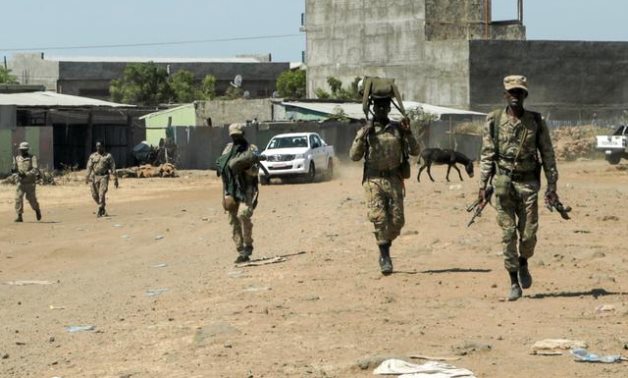
Members of the Amhara Special Force return to Dansha Mechanized 5th division Military base after fighting against Tigray People's Liberation Front in Danasha, Amhara region near Tigray November 9. REUTERS
CAIRO -22 November 2020: Amid the recent developments of the conflict in the Tigray region, international organizations stepped up efforts to resolve the crisis and end the ongoing conflict between the Ethiopian army and the Tigrayan Liberation Front before it exacerbates and affects the entire region.
These efforts come especially after thousands of Ethiopians and Eritreans fled to the Sudanese borders, and Eritrea entered the conflict after Asmara Airport was hit by two missiles.
South African President Cyril Ramaphosa, who is currently assuming the rotating presidency of the African Union, announced that the union had appointed three former presidents as special envoys for Ethiopia to try to mediate between the conflicting parties.
Ina statement, Ramaphosa said that former President Joachim Chissano of Mozambique, former President of Liberia Ellen Johnson Sirleaf and former President of South Africa Kgalema Motlanthe expressed their deep desire to resolve the conflict through dialogue.
He added the envoys would travel to Ethiopia to create the conditions for an open national dialogue to resolve the issues that led to the conflict, without setting a timetable.
For his part, Secretary-General of the United Nations António Guterres hailed the African Union’s move to appoint three high-level envoys to support efforts for a peaceful solution to the conflict in the Tigray region.
His spokesman, Stephane Dujarric, said that Guterres praised the move, expressing the the overwhelming support of the United Nations to resolve the crisis. The Secretary-General renewed the commitment of the United Nations to support efforts aimed at ensuring peace, stability and prosperity in Ethiopia.
Ethiopian Prime Minister Abiy Ahmed said he would meet the three envoys appointed by the African Union, but his office denied any move by the latter to mediate the conflict, according to Deutsche Welle.
A confidential UN assessment revealed that the Ethiopian national forces were facing severe resistance and a "war of attrition" in the northern Tigray region. Although officials in Addis Ababa have announced securing the main cities, paramilitary forces and militias deployed by the army are still struggling to secure lands.
Heavilyarmedforces continued advancing in Tigray, reaching the capital, Mikkeli, according to the British Guardian newspaper.
The report pointed out that the United Nations' documents and more than 12 interviews with aid workers from international organizations confirm international concerns that the two-week conflict threatens to turn into an ongoing battle that destabilizes one of Africa's most fragile regions.
The Guardian report indicated that cutting connections and preventing the entry of journalists caused an increase in the number of victims and injuries.
For its part, the United Nations High Commissioner for Refugees announced the arrival of thousands of displaced people to the Sudanese borders, and the Commission confirmed the start of preparations to receive up to 200,000 other refugees during the next six months.
"No one at this stage can predict the numbers of refugees who will come to Sudan," said Axel Bishop, the agency's representative in Sudan.
The number of displaced people from Tigrayans to remote border areas in Sudan has risen to 5,000 people per day, in light of the ongoing fighting between the Ethiopian army and local forces in the region.
"What is clear is that the fighting is continuous and sporadic, and we never know where it will happen next, so this lack of knowledge of what will happen causes more fear and more displacement," said Hamid Nuru, the World Food Organization's representative in Sudan.
According to Abdullah Fadl, the representative of the United Nations Children's Fund (UNICEF) in Sudan, children under the age of 18 make up about 45 percent of the refugees.
The conflict in north-west Ethiopia is the culmination of months of rising tensions between the TPLF and the ruling coalition in Addis Ababa. When national elections were postponed because of the pandemic, the TPLF conducted polls anyway, in a move that aggravated tensions.
Abiy Ahmed, who is Africa’s youngest leader and won the Nobel peace prize in 2019, launched his operation after accusing the Tigray People’s Liberation Front (TPLF) of attacking an armed camp and trying to seize military hardware. There are concerns that even if Abiy achieves his aim of forcing out the TPLF and imposing federal authority on Tigray, violence will continue.
Though they number only 6 million out of a total 110 million people living in Africa’s second most populous country, Tigrayans effectively ruled Ethiopia for decades. Until Abiy took power two years ago, they had been the strongest force in a multi-ethnic coalition. Abiy, whose parents are from the larger Oromo and Amhara ethnic groups, freed thousands of political prisoners and pledged to end domination by one ethnic group.
Comments
Leave a Comment